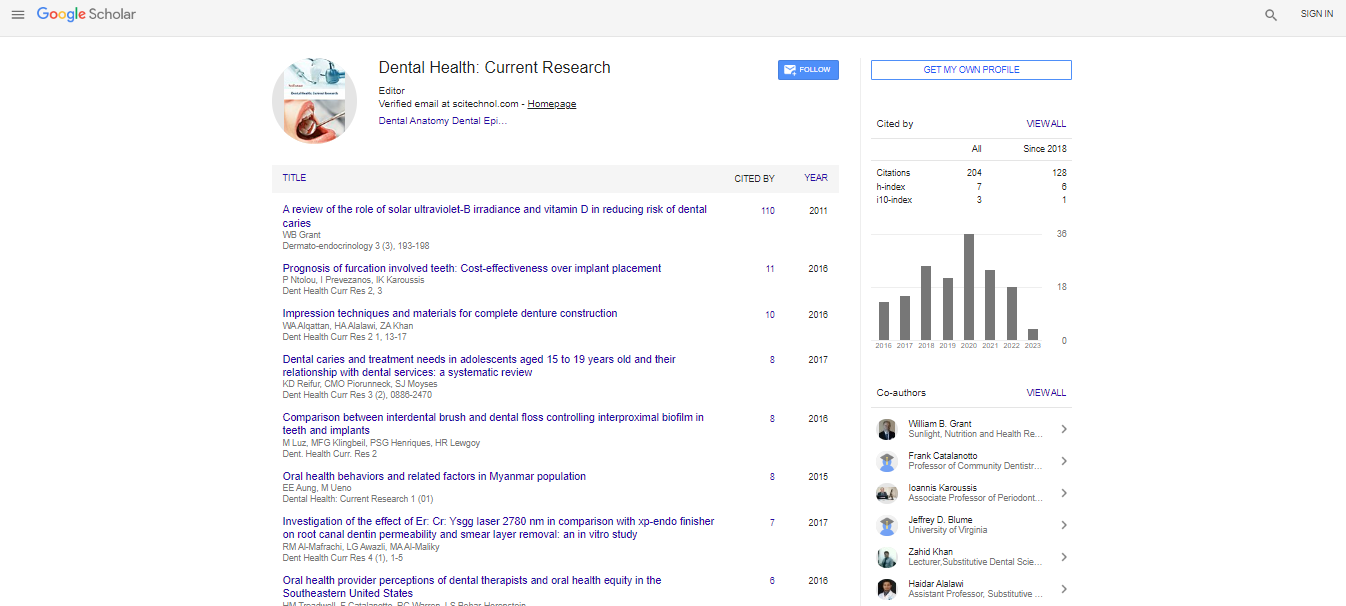Commentary, Dent Health Curr Res Vol: 10 Issue: 2
Rampant Caries in Children: Strategies for Prevention and Intervention
Savara Thaidored*
1Department of Pedodontics, University of Oregon Dental School, Portland, Ore. USA
*Corresponding Author: Savara Thaidored,
Department of Pedodontics,
University of Oregon Dental School, Portland, Ore. USA
E-mail: thaidoredsa@gmail.com
Received Date: 27 March, 2024, Manuscript No. DHCR-24-135543;
Editor assigned Date: 29 March, 2024, PreQC No. DHCR-24-135543 (PQ);
Reviewed Date: 12 April, 2024, QC No. DHCR-24-135543;
Revised Date: 19 April, 2024, Manuscript No. DHCR-24-135543 (R);
Published Date: 26 April, 2024 DOI: 10.4172/2470-0886.1000203.
Citation: Thaidored S (2024) Rampant Caries in Children: Strategies for Prevention and Intervention. Dent Health Curr Res 10:2.
Description
Rampant caries, a severe and rapidly progressing form of tooth decay, is a major concern in pediatric dentistry. This condition, characterized by extensive decay affecting multiple teeth, can cause significant pain, infection, and functional problems, impacting a child’s overall health and quality of life. Addressing rampant caries in children requires a multifaceted approach, combining preventive measures, early intervention, and community efforts to ensure better oral health outcomes. Rampant caries typically starts with the demineralization of tooth enamel, advancing quickly to affect deeper structures of the teeth. It often begins in the upper front teeth but can spread to other teeth if not promptly addressed. Several factors contribute to the development of rampant caries in children, including dietary habits, oral hygiene practices, fluoride exposure, and socioeconomic status.
A diet high in sugars and carbohydrates is a primary risk factor for rampant caries. Frequent consumption of sugary snacks, candies, and drinks creates an acidic environment in the mouth, which promotes the growth of caries-causing bacteria and leads to enamel erosion. Inadequate brushing and flossing habits result in the buildup of plaque, a sticky film of bacteria that produces acids leading to tooth decay. Young children often require assistance and supervision to ensure proper oral hygiene. Fluoride plays a important role in strengthening tooth enamel and making it more resistant to decay. Insufficient fluoride exposure, whether through drinking water, toothpaste, or professional treatments, increases the risk of rampant caries. Children from low-income families often face barriers to accessing dental care and education, which can lead to higher rates of dental problems, including rampant caries.
Educating parents and caregivers about the importance of oral health is essential. Teaching them about proper brushing techniques, the importance of fluoride, and the risks of sugary foods and drinks can significantly reduce the incidence of rampant caries. Programs in schools and communities can also help spread awareness among children and their families. Encouraging a balanced diet that limits sugary snacks and beverages is vital. Instead, promoting healthy snacks such as fruits, vegetables, and dairy products can help protect teeth from decay. It’s also beneficial to educate children about the importance of making healthy food choices. Ensuring that children receive adequate fluoride can significantly decrease the risk of rampant caries. This can be achieved through fluoride toothpaste, fluoridated drinking water, and professional fluoride treatments at the dentist’s office. Parents should be informed about the benefits of fluoride and the safe use of fluoride products.
Routine dental visits are important for early detection and management of dental issues. Regular check-ups allow for professional cleanings, application of sealants, and early intervention if decay is detected. Dentists can also provide personalized advice and preventive measures tailored to each child’s needs. When rampant caries is already present, prompt professional intervention is necessary. Treatments may include fluoride varnishes to strengthen enamel, dental sealants to protect molars, and fillings to restore decayed teeth. In more severe cases, crowns or root canal treatments may be required to save the affected teeth.
Advanced decay might necessitate more extensive restorative procedures. Stainless steel crowns, pulpotomies, or even extractions may be necessary to manage pain, infection, and restore oral function. These procedures help in maintaining the structural integrity of the mouth and ensuring proper development of permanent teeth. Implementing behavioral changes is crucial in managing and preventing rampant caries. Establishing a consistent oral hygiene routine, reducing the frequency of sugary snacks, and ensuring regular dental visits can help control existing decay and prevent new caries from developing. Community-based initiatives play a pivotal role in addressing rampant caries, especially in underserved populations. Programs that provide dental education, screenings, fluoride treatments, and access to affordable dental care can make a significant impact. Collaborations between schools, healthcare providers, and community organizations can create supportive environments for maintaining good oral health.
Conclusion
Rampant caries in children is a serious but preventable condition. By combining education, preventive care, dietary modifications, and professional dental interventions, we can significantly reduce the incidence and impact of severe tooth decay in children. Early action, sustained efforts in promoting oral health awareness, and improving accessibility to dental care are essential in combating this pervasive dental issue. Ensuring that children grow up with healthy smiles not only enhances their quality of life but also sets the foundation for lifelong oral health.
 Spanish
Spanish  Chinese
Chinese  Russian
Russian  German
German  French
French  Japanese
Japanese  Portuguese
Portuguese  Hindi
Hindi 